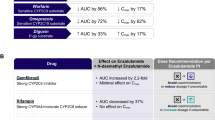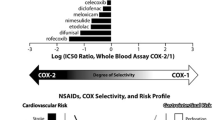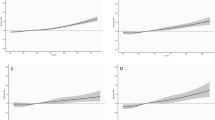Abstract
Purpose
Nonsteroidal anti-inflammatory drugs (NSAIDs) target the prostaglandin H synthase enzymes, cyclooxygenase (COX)-1 and COX-2, and reduce colorectal cancer risk. Genetic variation in the genes encoding these enzymes may be associated with changes in colon and rectal cancer risk and in NSAID efficacy.
Methods
We genotyped candidate polymorphisms and tag SNPs in PTGS1 (COX-1) and PTGS2 (COX-2) in a population-based case–control study (Diet, Activity and Lifestyle Study, DALS) of colon cancer (n = 1,470 cases/1,837 controls) and rectal cancer (n = 583/775), and independently among cases and controls from the Colon Cancer Family Registry (CCFR; colon n = 959/1,535, rectal n = 505/839).
Results
In PTGS2, a functional polymorphism (−765G>C; rs20417) was associated with a twofold increased rectal cancer risk (p = 0.05) in the DALS. This association replicated with a significant nearly fivefold increased risk of rectal cancer in the CCFR study (ORCC vs. GG = 4.88; 95 % CI 1.54–15.45; ORGC vs. GG = 1.36; 95 %CI 0.95–1.94). Genotype–NSAID interactions were observed in the DALS for PTGS1 and rectal cancer risk and for PTGS2 and colon cancer risk, but were no longer significant after correcting for multiple comparisons and did not replicate in the CCFR. No significant associations between PTGS1 polymorphisms and colon or rectal cancer risk were observed.
Conclusions
These findings suggest that polymorphisms in PTGS2 may be associated with rectal cancer risk and impact the protective effects of NSAIDs.
Similar content being viewed by others
References
Ulrich CM, Bigler J, Potter JD (2006) Non-steroidal anti-inflammatory drugs for cancer prevention: promise, perils and pharmacogenetics. Nat Rev Cancer 6:130–140
Wang D, Dubois RN (2010) Eicosanoids and cancer. Nat Rev Cancer 10:181–193
Ricciotti E, FitzGerald GA (2011) Prostaglandins and inflammation. Arterioscler Thromb Vasc Biol 31:986–1000
Smith WL, DeWitt DL, Garavito RM (2000) Cyclooxygenases: structural, cellular, and molecular biology. Annu Rev Biochem 69:145–182
Eberhart CE, Coffey RJ, Radhika A, Giardiello FM, Ferrenbach S, DuBois RN (1994) Up-regulation of cyclooxygenase 2 gene expression in human colorectal adenomas and adenocarcinomas. Gastroenterology 107:1183–1188
Kutchera W, Jones DA, Matsunami N et al (1996) Prostaglandin H synthase 2 is expressed abnormally in human colon cancer: evidence for a transcriptional effect. Proc Natl Acad Sci USA 93:4816–4820
Hull MA, Fenwick SW, Chapple KS, Scott N, Toogood GJ, Lodge JP (2000) Cyclooxygenase-2 expression in colorectal cancer liver metastases. Clin Exp Metastasis 18:21–27
Chan AT, Ogino S, Fuchs CS (2007) Aspirin and the risk of colorectal cancer in relation to the expression of COX-2. N Engl J Med 356:2131–2142
Oshima M, Dinchuk JE, Kargman SL et al (1996) Suppression of intestinal polyposis in Apc delta716 knockout mice by inhibition of cyclooxygenase 2 (COX-2). Cell 87:803–809
Patrono C, Patrignani P, Garcia Rodriguez LA (2001) Cyclooxygenase-selective inhibition of prostanoid formation: transducing biochemical selectivity into clinical read-outs. J Clin Invest 108:7–13
Rothwell PM, Wilson M, Elwin CE et al (2010) Long-term effect of aspirin on colorectal cancer incidence and mortality: 20-year follow-up of five randomised trials. Lancet 376:1741–1750
Patrignani P, Filabozzi P, Patrono C (1982) Selective cumulative inhibition of platelet thromboxane production by low-dose aspirin in healthy subjects. J Clin Invest 69:1366–1372
Pedersen AK, FitzGerald GA (1985) Preparation and analysis of deuterium-labeled aspirin: application to pharmacokinetic studies. J Pharm Sci 74:188–192
Tsikas D, Tewes KS, Gutzki FM, Schwedhelm E, Greipel J, Frolich JC (1998) Gas chromatographic-tandem mass spectrometric determination of acetylsalicylic acid in human plasma after oral administration of low-dose aspirin and guaimesal. J Chromatogr B Biomed Sci Appl 709:79–88
Cromlish WA, Kennedy BP (1996) Selective inhibition of cyclooxygenase-1 and -2 using intact insect cell assays. Biochem Pharmacol 52:1777–1785
Cryer B, Feldman M (1998) Cyclooxygenase-1 and cyclooxygenase-2 selectivity of widely used nonsteroidal anti-inflammatory drugs. Am J Med 104:413–421
Chulada PC, Thompson MB, Mahler JF et al (2000) Genetic disruption of Ptgs-1, as well as Ptgs-2, reduces intestinal tumorigenesis in Min mice. Cancer Res 60:4705–4708
Ulrich CM, Whitton J, Yu JH et al (2005) PTGS2 (COX-2) −765G > C promoter variant reduces risk of colorectal adenoma among nonusers of nonsteroidal anti-inflammatory drugs. Cancer Epidemiol Biomarkers Prev 14:616–619
Ulrich CM, Bigler J, Sparks R et al (2004) Polymorphisms in PTGS1 (= COX-1) and risk of colorectal polyps. Cancer Epidemiol Biomarkers Prev 13:889–893
Liu W, Poole EM, Ulrich CM, Kulmacz RJ (2011) Polymorphic human prostaglandin H synthase-2 proteins and their interactions with cyclooxygenase substrates and inhibitors. Pharmacogenomics J 11:337–347
Poole EM, Hsu L, Xiao L et al (2010) Genetic variation in prostaglandin E2 synthesis and signaling, prostaglandin dehydrogenase, and the risk of colorectal adenoma. Cancer Epidemiol Biomarkers Prev 19:547–557
Poole EM, Bigler J, Whitton J et al (2007) Genetic variability in prostaglandin synthesis, fish intake and risk of colorectal polyps. Carcinogenesis 28:1259–1263
Slattery ML, Potter J, Caan B et al (1997) Energy balance and colon cancer—beyond physical activity. Cancer Res 57:75–80
Slattery ML, Caan BJ, Benson J, Murtaugh M (2003) Energy balance and rectal cancer: an evaluation of energy intake, energy expenditure, and body mass index. Nutr Cancer 46:166–171
Slattery ML, Edwards SL, Ma KN, Friedman GD, Potter JD (1997) Physical activity and colon cancer: a public health perspective. Ann Epidemiol 7:137–145
Kampman E, Potter JD, Slattery ML, Caan BJ, Edwards S (1997) Hormone replacement therapy, reproductive history, and colon cancer: a multicenter, case-control study in the United States. Cancer Causes Control 8:146–158
Newcomb PA, Baron J, Cotterchio M et al (2007) Colon cancer family registry: an international resource for studies of the genetic epidemiology of colon cancer. Cancer Epidemiol Biomarkers Prev 16:2331–2343
Murtaugh MA, Ma KN, Benson J, Curtin K, Caan B, Slattery ML (2004) Antioxidants, carotenoids, and risk of rectal cancer. Am J Epidemiol 159:32–41
Slattery ML, Edwards S, Curtin K et al (2003) Physical activity and colorectal cancer. Am J Epidemiol 158:214–224
Slattery ML, Potter JD, Duncan DM, Berry TD (1997) Dietary fats and colon cancer: assessment of risk associated with specific fatty acids. Int J Cancer 73:670–677
Slattery ML, Levin TR, Ma K, Goldgar D, Holubkov R, Edwards S (2003) Family history and colorectal cancer: predictors of risk. Cancer Causes Control 14:879–887
Friedman GD, Coates AO, Potter JD, Slattery ML (1998) Drugs and colon cancer. Pharmacoepidemiol Drug Saf 7:99–106
Seufert BL, Poole EM, Whitton J, et al (2013) IkappaBKbeta and NFkappaB1, NSAID use and risk of colorectal cancer in the colon cancer family registry. Carcinogenesis 34(1):79–85
Coghill AE, Newcomb PA, Campbell PT, et al (2011) Prediagnostic non-steroidal anti-inflammatory drug use and survival after diagnosis of colorectal cancer. Gut 60(4):491–498
Carlson CS, Eberle MA, Rieder MJ, Yi Q, Kruglyak L, Nickerson DA (2004) Selecting a maximally informative set of single-nucleotide polymorphisms for association analyses using linkage disequilibrium. Am J Hum Genet 74:106–120
Thorisson GA, Smith AV, Krishnan L, Stein LD (2005) The international HapMap project web site. Genome Res 15:1592–1593
Ulrich CM, Bigler J, Sibert J et al (2002) Cyclooxygenase 1 (COX1) polymorphisms in African-American and Caucasian populations. Hum Mutat 20:409–410
Dudoit S, van der Laan MJ, Pollard KS (2004) Multiple testing. Part I. Single-step procedures for control of general type I error rates. Stat Appl Genet Mol Biol 3: Article13
Witte JS, Gauderman WJ, Thomas DC (1999) Asymptotic bias and efficiency in case-control studies of candidate genes and gene-environment interactions: basic family designs. Am J Epidemiol 149:693–705
Hamajima N, Takezaki T, Matsuo K et al (2001) Genotype frequencies of cyclooxygenase 2 (COX2) rare polymorphisms for Japanese with and without colorectal cancer. Asian Pac J Cancer Prev 2:57–62
Iglesias D, Nejda N, Azcoita MM, Schwartz S Jr, Gonzalez-Aguilera JJ, Fernandez-Peralta AM (2009) Effect of COX2–765G>C and c.3618A>G polymorphisms on the risk and survival of sporadic colorectal cancer. Cancer Causes Control 20:1421–1429
Thompson CL, Plummer SJ, Merkulova A et al (2009) No association between cyclooxygenase-2 and uridine diphosphate glucuronosyltransferase 1A6 genetic polymorphisms and colon cancer risk. World J Gastroenterol 15:2240–2244
Cao H, Xu Z, Long H, Li XQ, Li SL (2010) The -765C allele of the cyclooxygenase-2 gene as a potential risk factor of colorectal cancer: a meta-analysis. Tohoku J Exp Med 222:15–21
Dong J, Dai J, Zhang M, Hu Z, Shen H (2010) Potentially functional COX-2-1195 G>A polymorphism increases the risk of digestive system cancers: a meta-analysis. J Gastroenterol Hepatol 25:1042–1050
Zhu W, Wei BB, Shan X, Liu P (2010) 765 G>C and 8473 T>C polymorphisms of COX-2 and cancer risk: a meta-analysis based on 33 case-control studies. Mol Biol Rep 37:277–288
Pereira C, Medeiros RM, Dinis-Ribeiro MJ (2009) Cyclooxygenase polymorphisms in gastric and colorectal carcinogenesis: are conclusive results available? Eur J Gastroenterol Hepatol 21:76–91
Theodoratou E, Montazeri Z, Hawken S et al (2012) Systematic meta-analyses and field synopsis of genetic association studies in colorectal cancer. J Natl Cancer Inst 104:1433–1457
Siemes C, Visser LE, Coebergh JW, Hofman A, Uitterlinden AG, Stricker BH (2008) Protective effect of NSAIDs on cancer and influence of COX-2 C(-765G) genotype. Curr Cancer Drug Targets 8:753–764
Papafili A, Hill MR, Brull DJ et al (2002) Common promoter variant in cyclooxygenase-2 represses gene expression: evidence of role in acute-phase inflammatory response. Arterioscler Thromb Vasc Biol 22:1631–1636
Sanak M, Szczeklik W, Szczeklik A (2005) Association of COX-2 gene haplotypes with prostaglandins production in bronchial asthma. J Allergy Clin Immunol 116:221–223
Szczeklik W, Sanak M, Szczeklik A (2004) Functional effects and gender association of COX-2 gene polymorphism G-765C in bronchial asthma. J Allergy Clin Immunol 114:248–253
Sanak M, Plutecka H, Szczeklik W, Piwowarska W, Rostoff P, Szczeklik A (2010) Functional promoter polymorphism of cyclooxygenase-2 modulates the inflammatory response in stable coronary heart disease. Pol Arch Med Wewn 120:82–88
Zheng J, Chen S, Jiang L, You Y, Wu D, Zhou Y. (2011) Functional Genetic Variations of Cyclooxygenase-2 and Susceptibility to Acute Myeloid Leukemia in a Chinese Population. Eur J Haematol 87(6):486–493
Lee CR, Bottone FG Jr, Krahn JM et al (2007) Identification and functional characterization of polymorphisms in human cyclooxygenase-1 (PTGS1). Pharmacogenet Genomics 17:145–160
Cross JT, Poole EM, Ulrich CM (2008) A review of gene-drug interactions for nonsteroidal anti-inflammatory drug use in preventing colorectal neoplasia. Pharmacogenomics J 8:237–247
Acknowledgments
This work was supported by the National Cancer Institute, National Institutes of Health under RFA # CA-95-011, by Grants R01 CA114467, R01 CA112516, U24 CA074794, R25 CA094880, and R01 CA 48998, and through cooperative agreements with members of the Colon Cancer Family Registry and PIs. Funding was also provided for AJR by the National Cancer Institute Grant T32 CA09168 (Cancer Epidemiology and Biostatistics Training Grant). The content of this manuscript does not necessarily reflect the views or policies of the National Cancer Institute or any of the collaborating centers in the CFR, nor does mention of trade names, commercial products, or organizations imply endorsement by the US Government or the CFR. CCFR centers providing data for the analysis include the following: Australasian Colorectal Cancer Family Registry (U01 CA097735); Familial Colorectal Neoplasia Collaborative Group (U01 CA074799); Mayo Clinic Cooperative Family Registry for Colon Cancer Studies (U01 CA074800); Ontario Registry for Studies of Familial Colorectal Cancer (U01 CA074783); Seattle Colorectal Cancer Family Registry (U01 CA074794); University of Hawaii Colorectal Cancer Family Registry (U01 CA074806); and University of California, Irvine Informatics Center (U01 CA078296). The authors would like to thank Sandie Edwards for her contributions to the replication colon and rectal cancer studies. We also thank Darin Taverna, Jill Muehling, and Ling-Yu Kuan for genotyping assistance.
Conflict of interest
The authors declare that they have no conflict of interest.
Author information
Authors and Affiliations
Corresponding author
Electronic supplementary material
Below is the link to the electronic supplementary material.
Rights and permissions
About this article
Cite this article
Makar, K.W., Poole, E.M., Resler, A.J. et al. COX-1 (PTGS1) and COX-2 (PTGS2) polymorphisms, NSAID interactions, and risk of colon and rectal cancers in two independent populations. Cancer Causes Control 24, 2059–2075 (2013). https://doi.org/10.1007/s10552-013-0282-1
Received:
Accepted:
Published:
Issue Date:
DOI: https://doi.org/10.1007/s10552-013-0282-1




